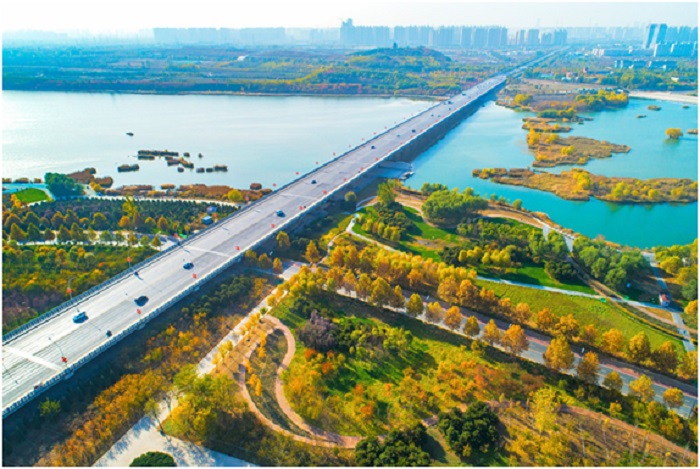



To enhance global environment governance is an urgent task that shall never be overlooked, and to build a prosperous, clean and beautiful world is common expectation of the international society.
UN Secretary-General Antonio Guterres called to make peace between mankind and nature, calling 2021 a key year to achieve it.
Men and nature are interdependent, and a sound ecosystem is essential for the prosperity of civilization. The COVID-19 pandemic triggered our profound introspection on the relation between men and nature, and the decreasing biodiversity and climate change are posing severe risks for human existence and development.
Some scientific findings have sounded an alarm. For instance, carbon dioxide levels are the highest in three million years and keeping climbing, and 2016-2020 is expected to be the warmest five-year period on record.
“Climate change will be our generation’s most profound challenge—and in 2021, the world will take its biggest steps yet to meet it,” said The Economist in an article under its The World in 2021 column.
Last year, environmental governance took an obviously increased share in global agenda. The 12th BRICS Summit Moscow Declaration reiterated the mechanism’s commitment to the implementation of the Paris Agreement and looks forward to further strengthening cooperation on environmental issues, in particular combating marine plastic litter as a key focus of the BRICS Clean Rivers Programme. The G20 Riyadh Summit launched the Global Coral Reef R&D Accelerator Platform and the Global Initiative on Reducing Land Degradation and Enhancing Conservation of Terrestrial Habitats, and reaffirmed the mechanism’s commitment to reduce additional pollution by marine plastic litter, as articulated by the Osaka Blue Ocean Vision. Besides, at the Climate Ambition Summit, 45 countries vowed to scale up their Intended Nationally Determined Contributions and 24 raised their goals on carbon neutrality. The international society is bringing up more visions for cooperation to jointly cope with climate change.
The next year, the process of global environment governance will be a focus of a series of important international meetings. The 15th Conference of the Parties (COP15) to the Convention on Biological Diversity, which is to be kicked off in China in 2021, will formulate the Post-2020 Global Biodiversity Framework, to chart the course and set goals for the world’s efforts to protect biodiversity in the next decade. The 26th session of the Conference of the Parties (COP26) of the UN Framework Convention on Climate Change (UNFCCC) to be held in the UK is about the execution of the Paris Agreement. Besides, countries will also gather at the 19th meeting of the Committee for the Review of the UN Convention to Combat Desertification, to explore a path to combat global desertification.
The international society is expecting to make further joint efforts and make an important step toward the goals set in the 2030 Agenda for Sustainable Development.
China is playing an increasingly prominent role in global environment governance. From the traditional Chinese wisdom that the laws of Nature govern all things and that man must seek harmony with Nature, to the new development philosophy emphasizing innovative, coordinated, green and open development for all, China has always prioritized ecological progress and embedded it in every dimension and phase of its economic and social development. Such vision is receiving more and more attention.
Taking forceful measures, the country has established the world’s largest clean energy system and met the Aichi Biodiversity Targets of protecting 17 percent of terrestrial areas ahead of schedule. It ranked the first in the world when it comes to the growth of forest areas in the past 10 years, carried out long-term and large-scale campaigns to fight desertification, and made effective results on wetland protection and restoration. Besides, the country is also in a leading position in the collection of biogenic resources.
Upholding the vision of building a community with a shared future for mankind and playing a major role in global environment governance, China is exploring a path of green and sustainable development and advancing global ecological progress with the rest of the world.
The country raised important proposals at the United Nations Summit on Biodiversity and the Climate Ambition Summit last year, injecting confidence and strength to the global climate governance. It promised to scale up its Intended Nationally Determined Contributions and adopt more vigorous policies and measures, aiming to peak carbon dioxide emissions before 2030 and achieve carbon neutrality before 2060. To peak carbon dioxide emissions and achieve carbon neutrality has been taken as one of the eight prioritized tasks of China by the country’s Central Economic Work Conference, which fully indicates the country’s major responsibility.
To build a beautiful world of harmony among all beings on the planet is a shared responsibility of all countries. “Ecological Civilization: Building a Shared Future for All Life on Earth” is the theme of the COP15 of the Convention on Biological Diversity, as well as a beautiful wish for the future of mankind.
The international society shall build more consensuses, unite closer, take concrete actions, and seek development opportunities and momentum from green development, so as to jointly protect the common homeland of mankind and write a new chapter of sustainable development.


The Humanitarian Service Diamond Awards has.
A Chinese Company, Inner Galaxy Steel.


The Programme Coordinator, Regulatory, Compliance and.


A Non-Governmental Organization (NGO), Committee for.
The Trustfund Pensions Limited has chided.


The House of Representatives Committee on.
The China General Chamber of Commerce.


Senator Chuka Utazi who represented Enugu.


An Abuja based Legal Practitioner, Ugochukwu.


The African business community in Yiwu,.
Leave a Comment